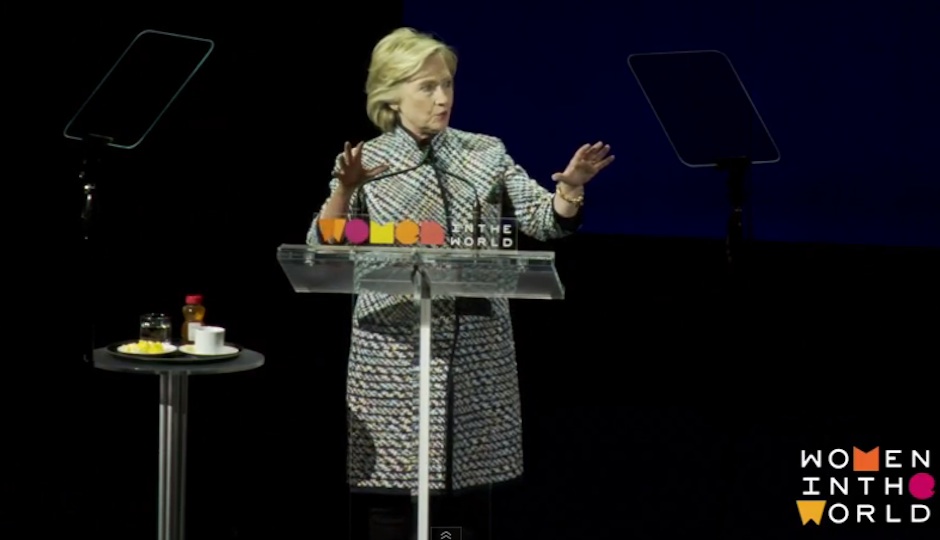What I Learned at The Women in the World Summit

Hillary Clinton at the Women in the World Summit.
Yeonmi Park was 13 when she and her mother escaped North Korea, but their battles were far from over: Once they reached China, her mother was repeatedly raped in front of her eyes, and both women endured brutal mental and physical anguish, ranging from having to submit to sexual encounters to hunger.
As Ms. Park eloquently told her story at the 2015 Women in the World Summit at New York City’s David Koch Theatre, there wasn’t a dry eye in the house—male or female—as she tearfully proclaimed, “For the first time in my life, I own me, I own myself.”
I received a last-minute invitation to attend the Thursday portion of the three-day summit as a seat filler from a casting agency. Sure, the list of headliners enticed me to take them up on their offer: Hillary Clinton, Ashley Judd, Barbra Streisand, and Katie Couric were all scheduled to speak. But still, the question remained: What would I, a young gay man, get out of attending a women’s conference? I quickly learned the answer: a lot. The issues and innovation discussed at the summit showed how gender and sexuality aside, we’ve all got a lot to learn about equality, and there are remarkable individuals making huge strides to help people across the globe.
A perfect example of a basic gender inequality that is killing millions of women across America is heart disease, or, more notably, how doctors and our culture have major misconceptions of the signs and symptoms of women suffering from the disease. Barbra Streisand, the co-founder of the Women’s Health Alliance, even alluded that medicine and science itself is gender biased: Labs have ironically used male mice to perform tests as it relates to female heart disease, and there’s even been a phrase coined by researchers called the “Yentl Syndrome” after the movie that Streisand starred in where she had to disguise herself as a man. The syndrome suggests that for women to accurately get a heart disease diagnosis from a doctor, they have to present male symptoms of the disease, which differ than the female symptoms.
Another shocking panel discussed maternity mortality and how certain areas in America have a higher maternity mortality rate than sub-Saharan Africa. We learned from Dr. Priya Agrawai, Executive Director of Merck for Mothers, that her program wasn’t going to initially examine this phenomenon in America, but after research showed the insanely high rates of maternal mortality in the states, they quickly started investigating. This, of course, stems from a lack of resources and education right here in our own backyard.
Katie Couric moderated a discussion on online harassment, abuse, threats, and revenge porn. Actress Ashley Judd nervously talked about her own experiences with legitimate online threats to her life, and Anita Sarkeesian, founder of Feminist Frequency and victim of this type of online bullying, made a stark observation: Men who are bullied and threatened online tend to be targeted because of their lack of masculinity and are “name called” (i.e. “faggot,” etc.), where women are physically threatened. As she put it, there’s a big difference between “free speech” and someone saying they want to literally kill you.
The afternoon closed with Presidential nominee Hillary Clinton, who gave a rousing speech about how female and sexual equity were more than just personal beliefs, but that she clearly was a candidate who understood these issues compared to the other party. She made no mistake to reference the fact that the only way to embrace equality is to provide full and equal rights to LGBT populations, which was met to a cheering crowd.
So why is it important for men to be aware, almost on an intimate level, with issues that deal with gender? After sitting through the heart disease panel, I sent a tweet to the moderator, Dr. Jennifer Ashton of ABC News. I told her that the panel presented extremely relevant information as it related to my mother’s own past struggles with her health. Her response back to me summarizes why we need to care:
https://twitter.com/DrJAshton/status/591557664729128960


